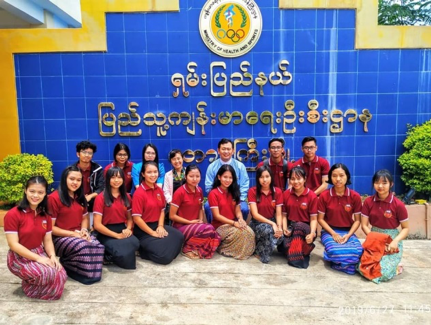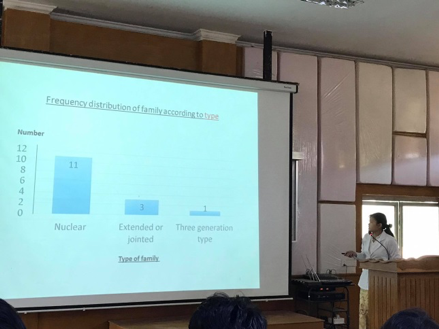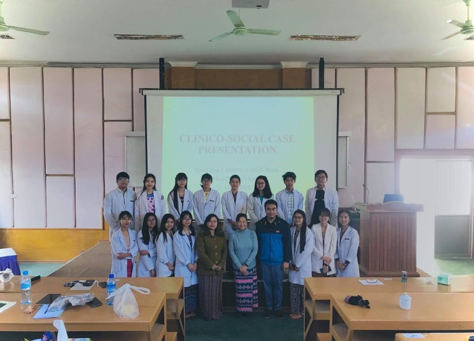According to the recent curriculum, all Final Part I students must attend urban positing in the morning from 9:00 am to 11:30 am. Final Part 1 students are divided into five groups for urban posting. Each posting group must visit to aware of preventive and social activities sites in Taunggyi City. Those visits aim to study organization setup, functions and activities of public health related departments such as Urban health center, Food and Drug Administration, Home for the Aged, Township Water Distribution system, Township Waste Disposal system, School Health, Vector borne disease control unit, Rehabilitation Services of Sao San Tun Hospital. Family Health Care (FHC) visits and Clinico-social cases (CSC) taking are also important parts of urban posting. Final Part 1 students must participate in identification of health and social problems of allotted family to learn about comprehensive health care; preventive, promotive, curative & rehabilitative services and observe and analyze social and environmental factors of that assigned family during FHC visits. To make students aware of the influence of the social factors in disease causation, also in effective management of diseases and to create students’ awareness of the importance of comprehensive health, CSC visit is conducted under the guidance of P&SM Department and supported by teachers from Medicine, Surgery, OG Child words in the Sao San Tun and Women and Children Hospitals.

Students study visit to Shan State Health Department, Taunggyi

FHC presentation by PSM posting students

Clinico-social presentation in PSM posting
Residential Field Training Program, a three-week-course, is the required curricular activities for the Final Part 1, MBBS students to acquire the community exposure during under graduate medical training in accordance with the guidelines recommended by the medical education seminars and Myanmar Medical Council. The program is mainly an observational tour with participatory and research elements to some extent. During the first week and 2nd week, the students are posted at the township level and during 3rd week, they are trained in the rural areas. Groups of 8 (or) 10 students of both sexes are sent to the townships assigned for the institute. Currently, (8) townships have been selected by the joint efforts of the Department of Human Resource for Health, Department of Public Health, and Department of Medical Care. At the end of the 3 weeks residential field training the students should be:

Study visit to Sub-rural health center during RFT